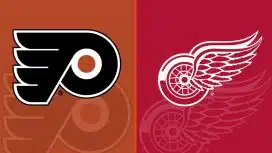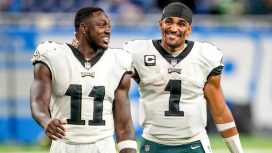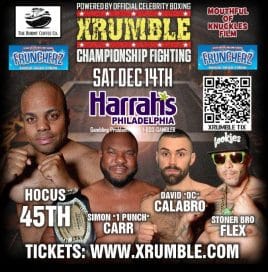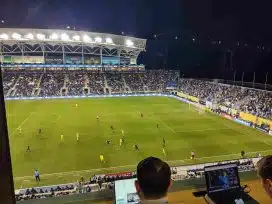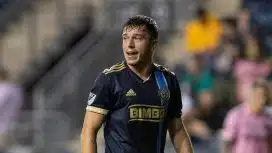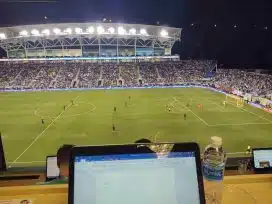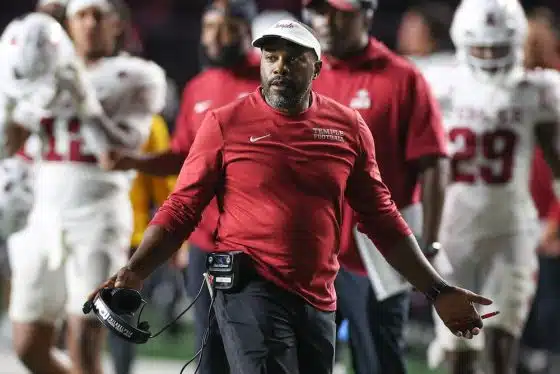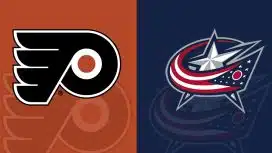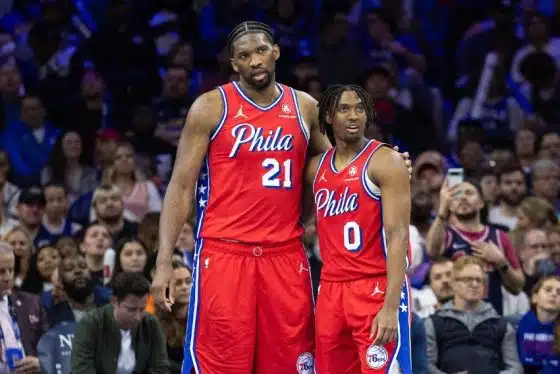Phillies
Top 25 Phillies of All-Time: No. 13 – Dick Allen
By: Matt Alberston, Historical Columnist
If you walk into a barber shop, cigar shop or any place where a group of silver-haired men gather to talk, and you mention the name Dick Allen, you're likely to hear a few stories. These stories will probably be related to Allen's hitting power and/or his reputation as a controversial baseball star.
In the history of the Philadelphia Phillies, no player has packed a wallop like Allen – not Ryan Howard, not Mike Schmidt and not Jim Thome. Allen was in a class all his own. He swung a gargantuan 42 ounce bat which helped power multiple baseballs to tape measure distances, even a few which were projected to be over 500 feet. This kind of power put fans on the edge of their seats whenever Allen stepped into the batters box.
Not only could Allen hit for power, but he was a nimble base runner as well, as he averaged 30 doubles and seven triples a season. He stole 133 bases in his career, while being caught 52 times. Those numbers may seem pedestrian, but remember Allen was known primarily as a superb power hitter.
The "Wampum Walloper" is the most misunderstood player of his generation. He was booed and jeered in his early tenure with the Phillies and carried the moneker as a troublemaker throughout his career. Indeed, his confrontation with teammate Frank Thomas lurked everywhere he went, even today, which is part of the reason why baseball statistician Bill James thought that Allen was the second most divisive player in major league history, behind only Rogers Hornsby. But in recent years, Allen's attitude and his career are being reexamined.
Pittsburgh Pirates Hall of Famer Willie Stargell placed Allen's controversial reputation into context. "Dick Allen played the game in the most conservative era in baseball history. It was a time of change and protest in the country, and baseball reacted against all that. They saw it as a threat to the game. The sportswriters were reactionary too. They didn't like seeing a man of such extraordinary skills doing it his way. It made them nervous. Dick Allen was ahead of his time."
Stargell even provided an anecdote to the environment Allen dealt with in Philadelphia's Connie Mack Stadium. "Now I know why they boo Richie [Allen] all the time. When he hits a home run, there's no souvenir."
Allen's career is being reexamined. In 2014, he came one vote shy from being inducted into the National Baseball Hall of Fame. One sports writer, the Inquirer's legendary writer Stan Hochman, remained in Allen's corner for decades. Hochman put it plainly:
"Dick Allen led teh entire cockeyed world of baseball in OPS-plus for 10 years from 1964-1973. His number was 165, higher than Hank Aaron, higher than Willie McCovey, higher than Frank Robinson, Harmon Killebrew, Willie Stargell, Roberto Clemente and Willie Mays. Dominate any phase of the game for 10 years, pitching or hitting or slugging, and you oughta be in the Hall of Fame. Allen is not in the Hall of Fame. The other seven guys are. "
Allen was Philadelphia's Jackie Robinson. He played at an extremely high level in an increasinly racialized era. He was an individualist who went about his business not by what baseball tradition expected, but by how he preferred to be treated as a player and human being.
Career accomplishments
- 1964 National League Rookie of the Year
- Seven time All-Star, three with the Phillies (1965-1967)
- 1972 American League MVP (with the Chicago White Sox)
- Hit over .300 in seven different seasons (four times with Phillies
- Ranks 21st all-tim in MLB history in career OPS+ (156)
- Ranks 61st all-time in MLB history in career offensive WAR (69.9)
Most memorable moment
It's difficult to point to one particular memorable Dick Allen moment. He hit at least one home run over the Coca-Cola sign which sat atop Connie Mack Stadium's left field overhang. The home run was projected to be over 520 feet. His 410 and 450 foot home runs to dead center field at Connie Mack are also awe inspiring. These are the factoids that legends are made out of, but what might be more impressive is Allen's effort on the last day of the 1968 season.
The Phillies entered the season's final game at 75-86 and mired near the bottom of the National League standings. The Phillies sent Chris Short to the mound to face the New York Mets at Shea Stadium and future Hall of Famer Tom Seaver.
Seaver had the Mets cruising through the middle innings until the top of the 6th. Phillies right fielder John Briggs singled to right field to open the frame, but a groundout and strikeout followed. With two out and one on, Allen stepped to the plate and hit a Seaver pitch over the right-center field wall and tied the game at two runs a piece.
In the bottom of the 8th, with the Phillies clinging to a 4-3 lead, Allen smacked a solo shot off of Mets relief pitcher Cal Koonce to extend the Philadelphia lead to 5-3. After giving up two runs earlier in the game, Phillies start Chris Short sent the Mets down 1-2-3 in the bottom of the 8th.
In the top of the 9th, the Phillies still led a tight 5-3 ballgame when the Philadelphia offense began to get hits off of Mets reliever Ed Kranenpool. After Gary Sutherland extended the lead to 6-3 with a single to right field, the Mets replaced Kranepool with Bil Short, who struck out Tony Gonzalez. Short was lifted and Ron Taylor stepped on the rubber to face Allen, who was 2-4 with two home runs.
Allen slammed another ball over the fence, this time for a grand slam, and extended the lead to 10-3 Phillies. Allen ended the day 3-5 with three home runs, including a grand slam, and tallied seven RBI.
Reasoning for ranking
Allen recorded six seasons as a 2+ WAR player, four seasons as a 5+ WAR player, and one sason as an 8+ WAR player for a total of 26 points. He sits ninth all-time in Phillies OPS, 11th in triples, tenth in home runs, and 19th in RBI for a total of eight points. His nine years as a Phillie added another three points to his total score for a total of 37 points
Previous entries
- No. 25, Garry Maddox
- No. 24, Roy Thomas
- No. 23, Gavvy Cravath
- No. 22, Chris Short
- No. 21, Cy Williams
- No. 20, Curt Schilling
- N0. 19, Cole Hamels
- No. 18, Ryan Howard
- No. 17, Sam Thompson
- No. 16, Del Ennis
- No. 15, Johnny Callison
- No. 14, Jim Bunning
Formula explained
The player rankings formula combines both traditional and advanced statistics/metrics and assigns a point total to each category. These statistics only reflect the player's Phillies career.
